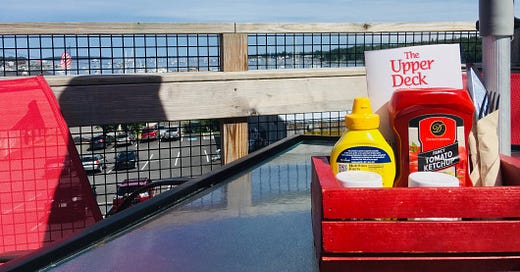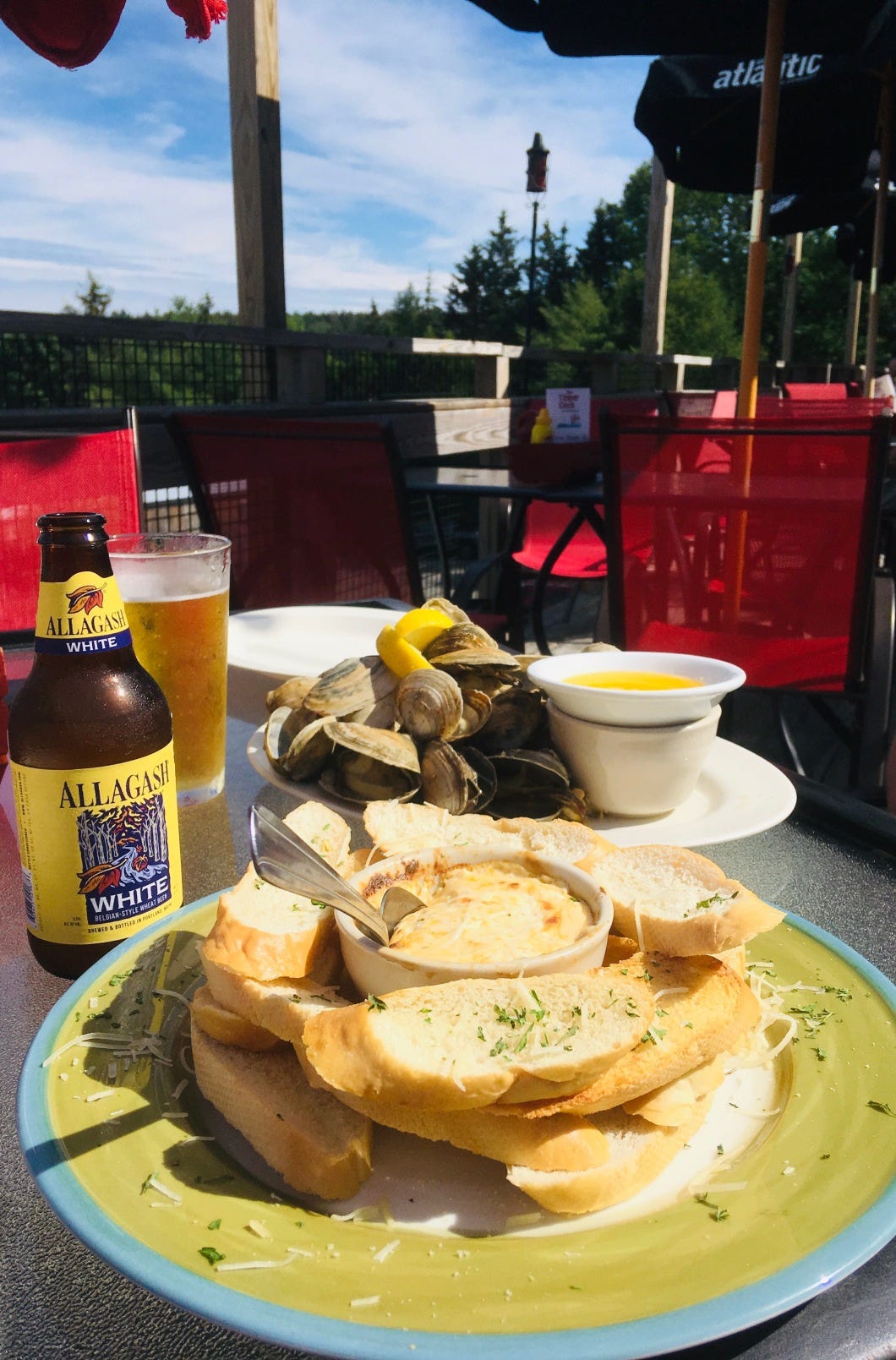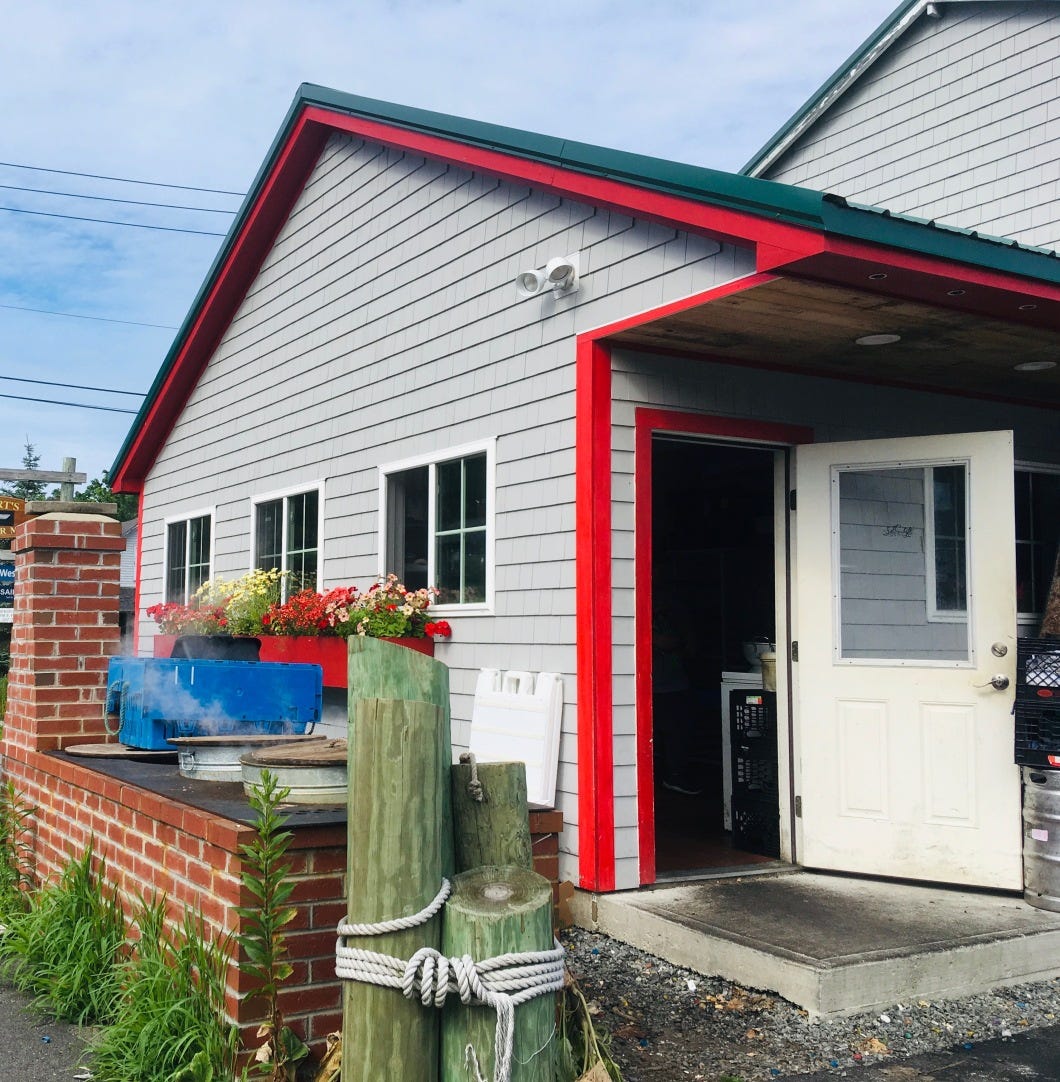He’s a pretty hip-looking server and he leads us to our outside table, but despite all his confidence and charisma, he trips a bit. His red Converse scuff against each other.
“Are you okay?” I reach out my arm to steady him even though he’s in front of me and obviously completely fine.
“I am having such a hard time picking up my feet,” he admits.
It’s tourist season on Mount Desert Island and it’s safe to say that a lot of people in the service and tourist industries are tired right now, so tired that picking up their feet isn’t easy anymore. It’s an effort.
Still, he smiles and leads us to a table.
I ask again if he’s okay, if he’s going to be okay, and he hand us our menus and assures me he will be just fine before adding, “I appreciate you guys. I really do.”
Next to us is a table full of people in Bar Harbor t-shirts. They hold cell phones in their hands despite the amazing view beyond the restaurant’s deck, the brilliant blue sky, and the deep blue-gray harbor below us that’s dotted with sailboats, Sunfish, and fishing trawlers.
We’re sitting at the Upper Deck in Southwest Harbor, a restaurant that has a back deck (thus the name) that allows customers a view of the Atlantic, Little Notch Bakery and other buildings on the short street below. It’s about 4:30 p.m. and dinner isn’t officially being served yet, but lunch still is happening. It’s mid-week. Tourists are starting to fill the tables even though it’s not a prime time.
Their conversations run all over the place.
“Sand Beach is a rip-off,” one says.
“I liked it. It’s unusual for here.”
“It’s just a beach with sand.”
At another table another tourist, obviously also eavesdropping, grumbles, “How can a beach be a rip-off? You don’t even pay to go to the beach. You pay to go into the whole national park.”
His friend announces, “Sand Beach is the shit.”
This shuts up the original tourists who were complaining.
We order beers because apparently we might need them. The table umbrellas alternately advertise Budweiser and Atlantic Brewing. A tourist chuckles at the ‘Save the Ales’ motto on the dark blue Atlantic Brewing umbrellas and starts to talk about some guy Adam.
“Adam, I like,” he announces.
There is general agreement at the table. “Adam is a good guy. His wife though? Ugh.”
“He is so sweet. He sent me a text the other day,” says the woman at the table.
Everyone else shuts up. She does not elaborate about the text’s actual contents. They all pick up their phones.
Two seconds later there is a declaration. “Oh! Oh! Someone liked my post! An official site! Visit Bar Harbor!”
The man with the post and the like from our local Chamber of Commerce’s account is dancing in his seat with joy.
Two of the three servers huddle around him when he calls them over and smile at him as he shows them the like.
“I feel like a celebrity,” he announces as they leave.
His tablemate raises her eyebrows. “Because of the post?”
He puts his phone down and gestures towards the two servers who are off filling drink orders now, talking to other people. “No, because of them.”
They celebrated with him. They paid attention. In real life.
According to the Pew Research Center, 96 percent of Americans own a cellphone. About 81 percent of those phones are smartphones. A new study from San Francisco State University says that ‘over-attachment’ to our phones can increase our feelings of isolation and loneliness. If we’re depressed and anxious? It can make it worse. One researcher likened our dependence on our smartphones to that of opioid addiction.
The beauty of Acadia National Park, Mount Desert Island, and places like the Upper Deck is that it’s hard to replicate with words or photos or screens. It’s an experience that requires looking up from the screen and interacting in order to truly enjoy.
As we leave the Upper Deck, a guy in a t-shirt who has been cooking over steaming lobster pots ducks into the parking lot to get some air.
“It was great,” we tell him.
His face transforms into a smile. He reminds me of the man with the post and the phone, the way his countenance goes so quickly towards connection, towards joy.
“Thank you! Thank you!” He lifts his arm so that it’s fully extended over his head and waves. “You have a good night.”
That’s what this is about, this life, this place. It’s about connections that go beyond technology. It’s about reaching out with simple comments and observations, the empathy that happens when your server is so tired that they tripped just walking, but they can still smile and cheer for a post like. It’s about noticing the guy who made your meal. It’s about listening and experiencing the world beyond your screen and remembering you’re just a tiny little piece of it. And maybe? Maybe you can be like Adam and thought of as a good guy. And maybe? Maybe you can celebrate other people’s tiny moments with them.
Isn’t that what vacation is supposed to be about? But more than that, isn’t that what life is supposed to be about?







